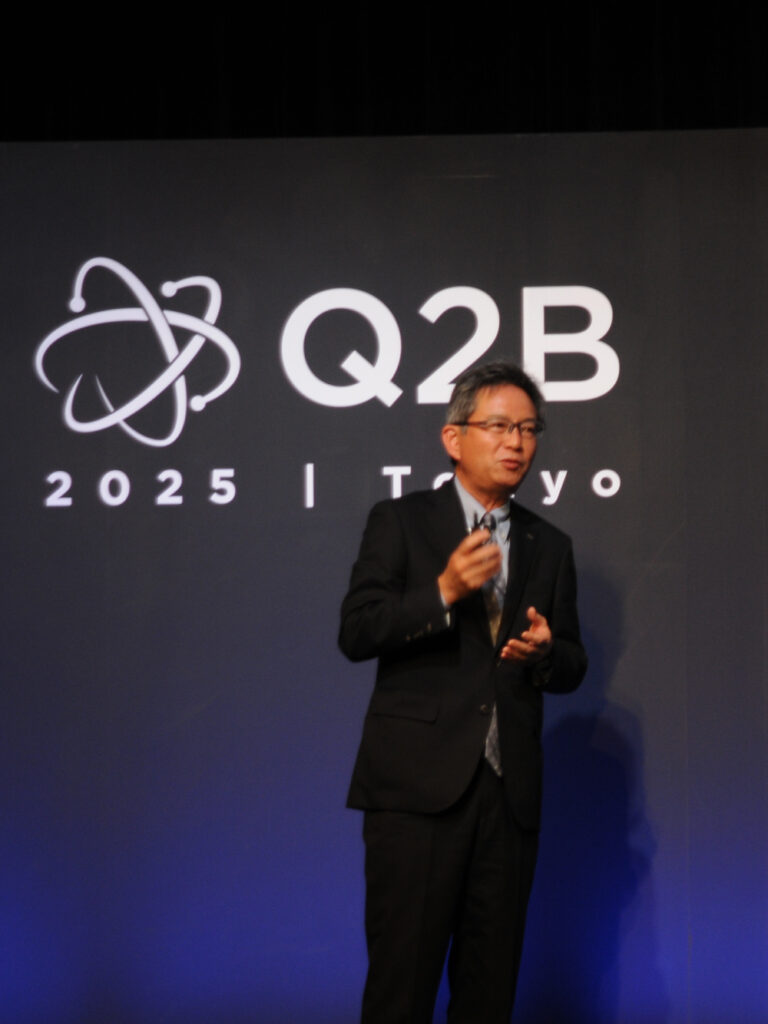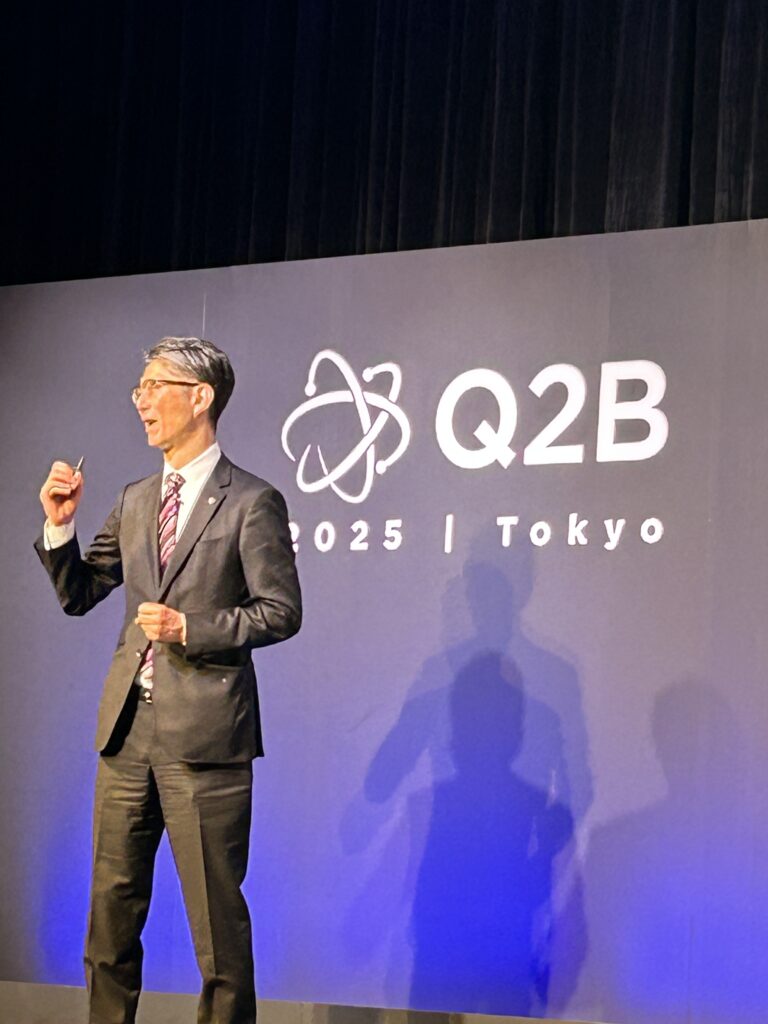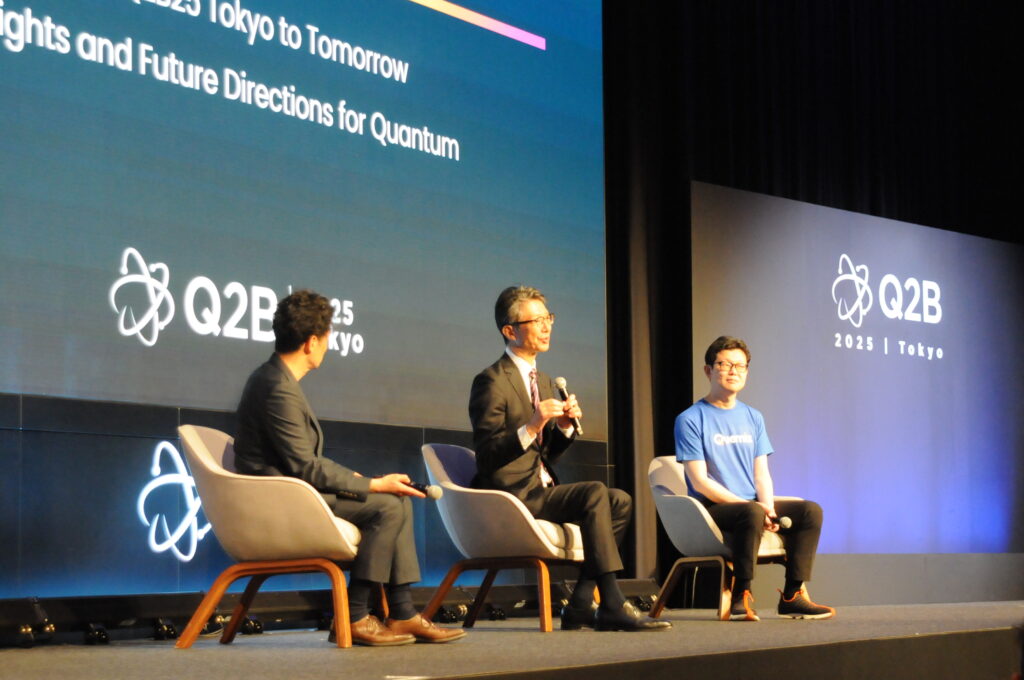At Q2B Tokyo 2025, held from May 15 to 16, 2025, Q-STAR’s Representative Director Mr. Shimada and Executive Committee Chair Mr. Okada took the stage to share an overview of Q-STAR’s activities. They delivered a passionate message about the latest trends in quantum technology and its future prospects.
In addition, Q-STAR member companies showcased their businesses and services at exhibition booths, deepening engagement with numerous attendees amid the early-stage global development of the quantum computing industry.
Furthermore, through presentations by speakers in multiple sessions, a wealth of technical knowledge was shared, creating a platform for global information exchange and knowledge sharing. Participants engaged in discussions on cutting-edge research and technological trends, fostering active dialogue aimed at advancing quantum technology.
Quantum Sensing & Timing , Quantum Error Correction ,
From Vision to Deployment: Quantum’s Next Chapter
Introduction of Q-STAR’s Activities and Message to the Industry
On the first day of the event, Executive Committee Chair Mr. Okada delivered a presentation titled “Japan’s Initiative and Ambition in the Quantum Industry.” In his talk, he explained how Japan can contribute to the quantum revolution and the development of its value chain by leveraging its strong technological capabilities and a business foundation rooted in manufacturing. He introduced Q-STAR’s initiatives, including collaboration with a wide range of member organizations, the creation of practical use cases, and efforts to foster talent in the field. Moreover, he emphasized the importance of international partnerships and expressed a clear commitment to building a globally cooperative framework for advancing the quantum industry.

On the second day of the event, Chair of the Board Mr. Shimada, delivered a keynote speech titled “Creating Quantum Market and Ecosystem.” In his address, he spoke about the transformative potential of quantum technology across society, the economy, and the environment. He emphasized the importance of Japan integrating quantum technology into all aspects of society to drive industrial growth and address social challenges. Mr. Shimada also expressed Q-STAR’s strong commitment to contributing to the global advancement of quantum technology by strengthening international collaboration.
Looking ahead, Q-STAR aims to continue deepening its partnerships with quantum-related organizations both in Japan and abroad, with the goal of promoting the development and social implementation of quantum technologies and contributing to broader societal progress.
Mr. Shimada concluded his speech with a powerful message: “Tokyo is the center of the quantum industry.”

On the second day of the event, a panel discussion was held featuring Mr. Taro Shimada, Chair of the Board of Q-STAR, together with Yu-ichiro Matsushita, President and CEO of Quemix Inc., and Toshiyuki Nakadoi, COO of Quemix Inc.,Together, they engaged in a dynamic discussion on the future of international collaboration and industrial applications of quantum technology.
Mr. Shimada spoke about the progress of quantum technology implementation in Japan and emphasized the importance of collaboration between industry and academia. He strongly asserted that the advancement of quantum technology should not be driven by closed competition, but rather by open international cooperation, underscoring the necessity of global partnerships.
The session also highlighted the current state of quantum technology development within companies, the challenges toward practical implementation, and expectations for the Japanese market. It reaffirmed the need for cultivating quantum talent and building an international ecosystem. There was a shared understanding that nurturing young researchers and engineers is directly linked to the future competitiveness of the quantum industry, and a clear direction for future collaboration was presented.
Mr. Shimada also referenced Q-STAR’s international partnerships through ICQIA, as well as the Memorandum of Understanding signed with UKQuantum in April 2025. He stated that by building a strong and open framework for cooperation, the social implementation of quantum technology can be accelerated. Representing Japan’s quantum industry, he called for deeper collaboration with both the government and the international community. He further analyzed Japan’s strengths in materials, measurement, and manufacturing, and emphasized that leveraging these advantages to actively participate in the creation of global standards would serve as a growth strategy for Japanese companies. He also outlined Q-STAR’s vision to promote testbeds and joint development of use cases in collaboration with international consortia such as G-QuAT, while advancing standardization efforts and talent exchange.
His remarks conveyed a strong determination for Japan to demonstrate international leadership in quantum technology and to shape the future of industry and society through open and cooperative efforts.

Participating Q-STAR Member Companies at Q2B Tokyo 2025
Co-host & Platinum Sponsor
Diamond Sponsors
Gold Sponsors
Showcase Sponsors
Exhibitors
- Oxford Quantum Circuits (OQC)
- National Institute of Advanced Industrial Science and Technology (AIST), Global Research Center for Quantum and AI Fusion Technology (G-QuAT)
- LQUOM Inc.
Partner
